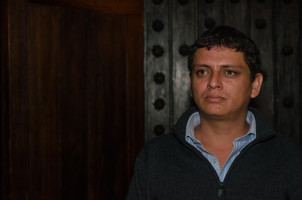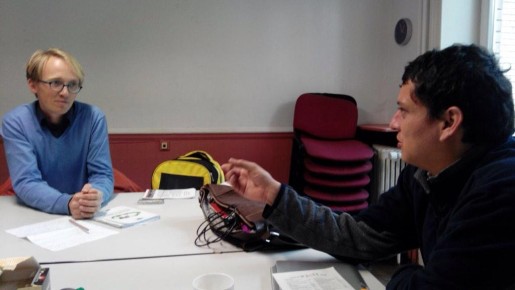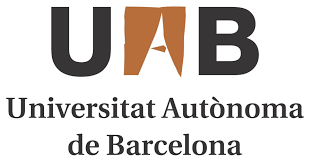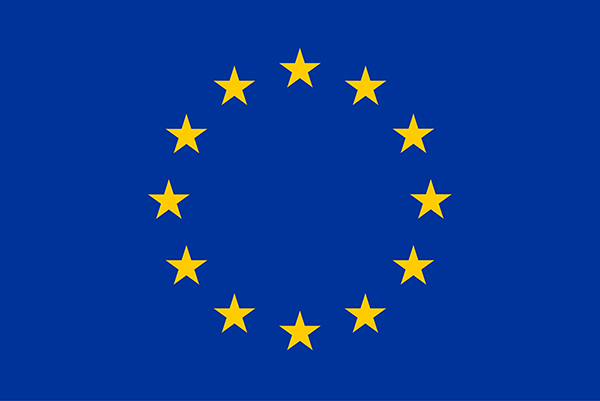
By Nick Meynen. ‘We’re in front of the International Criminal Court now! We’re just about to get in. I’ll let you know when it’s done’. He hung up, went in and dropped the bomb in an office. Forty minutes later we called again. ‘We did it!’ The ‘time-bomb’, 50 pages long, had travelled all the way from the polluted jungle of North-East Ecuador, better known as the Chernobyl of the Amazon. When it goes off, John Watson, the CEO of Chevron, will need to explain why he’s obstructing a court-mandated clean-up of toxic contamination in the Amazon, putting thousands of lives at risk. If he loses, the oil industry will never be the same.
Meeting a man on a mission
One day earlier, in the House of Peace in Brussels. Julio Prieto, who represents the 30.000 Ecuadorians that try to get justice delivered by Chevron, receives me for an interview. He calls himself the right hand of Pablo Fajardo, who also represents the Afectados (victims). Julio comes across as a humble, low-profile man but also as a man who knows very well what he’s doing. ‘I coordinate the actions abroad. The plaintiffs opened a case in 1993 in New York, but Chevron wanted to be judged in Ecuador. After many years on the legal battlefield they were granted this right, under the condition of the judge that Chevron would respect the outcome in Ecuador. In 2011 the highest court in Ecuador ordered Chevron to pay 9.5 billion US dollar to clean up the huge mess they left behind. Chevron refused. So we convinced lawyers in Brazil, Argentina and Canada – where Chevron has assets – to enforce the judgement in these countries. It’s no easy work. Brazil is totally different from Canada. You have to think what to say to each person and how you say it.’
Julio probably uses the same instinct in this interview, taking his time to come up with the right words. For example when I ask him to speculate a bit and to tell me which of the cases he thinks is the most promising. ‘If I have to bet on it, I would bet on Canada. We are expecting a Supreme Court decision in February or March and Chevron has enough assets in Canada. But we’re almost that far in Brazil as well. Then there’s the process in New York from Chevron against us. We are confident that the 2th circuit will overrule the ridiculous ruling by Judge Kaplan and that this will open the way to collect the money in the US. Do you know what this judge did? He first ordered all judges in the world to stop us from submitting cases, but this was overruled by the 2th circuit. So now he orders all judges in the world to give any money that we collect from Chevron, back to Chevron. This is crazy but we trust that the 2th circuit will also say this. That trial is a circus. It doesn’t even have a jury and it relies on one witness who received over a million US dollar from Chevron and has a track record of being bribed. So once the Kaplan circus is over, we are going to Chevron’s home.’
Julio was referring to the racketeering case opened by Chevron in New York, with the aim to open a frontal attack on all the people defending the Ecuadorians. Chevron managed to get rid of a jury and convince a one-sided judge to rule that anyone who supports them can also be sued – effectively cutting the Ecuadorian team off from funding. ‘They gave us the treatment given to terrorists. We had to let go most of our small legal team of four in Quito, due to lack of funding, but this will not stop us. Pablo and I (with the help of our friends) will continue this till the end.’ And with justice on their side, they’re never alone. Eminent lawyers in the US have spoken out against the Kaplan ruling and the decision is most likely to be undone when the 2th circuit rules on the case in February 2015. I ask about his feeling when the Kaplan ruling came in, but Julio merely shrugged and laughed. ‘It was no surprise for us. During the trial it was already clear that he did not want to listen to our facts. They found a way to slow us down; by cutting us off from funds. But we are going to keep doing this until this is over. Look, before this ruling we were no rich lawyers either. We got some support and were able to sustain our families and pay our bills but it didn’t compare to what my former class mates are making, who are working in corporate law. I’m the romantic human rights lawyer that they make fun of. In the last two years, with this ruling, life became harder for us and in the last four months we didn’t collect any money. It’s difficult to swallow your pride and ask your father to advance the rent of your flat, at the age of 34 and being graduated from the best law school in the country. But my parents and friends support me. This trip, for example, is totally paid by supporters. I have 5 euro in my pockets. But I don’t mind. This is all a matter of time. There are 3 decisions coming in the next year: in Canada, Brazil and US. We only need to win 1.’
The personal struggle
We exchange funny stories of non-funded activism and how our wives, parents and friends commented on that. Recalling the reactions from his partner he said ‘Yeah, she sometimes said “You are a lawyer, when are you going to find a real job?” I asked for patience. But now she’s really supportive. She used to be a corporate lawyer, until I took her to a beautiful place in the Amazon, similar to the beauty in the Yasuni Park. We spend a few nights camping there. I think that was the catalyst for her to change. She quit that job and now she is working in human rights. So she really understands me – but she still wants shoes and vacations.’
‘So tell me a bit more about yourself: who is Julio Prieto? Where did he grow up, how did he become a lawyer and how the hell did he get involved in this case?’ ‘I come from Quito. My parents are not rich but not poor either. They were able to pay for me to go to the best college in Ecuador. My teacher was attorney for the victims and he asked me to join him. I just went. After a few years he couldn’t keep working but I stayed.’ ‘So you came from Quito and you had to win the trust and confidence of the Afectados?’ ‘In the beginning I was just doing legal work in Quito but with time going on I started to go to the jungle and to meet people; to know their story. That is how I became involved. Once you see the pollution, the cancers, the sick people and you talk to them and you know their story, there is no turning back. And there I met Chevron. We arrived in this small van, with a full team of four people. They arrived with 20 trucks and ten well-paid corporate lawyers shouting about Chevron here and Chevron there.’ ‘Did they intimidate you?’ ‘At the beginning they send me a strong message; I have my private office and the week I start working in the place someone broke in my office. Well, of course they didn’t leave a note but nothing was stolen, not even the money in the office. Then there were a few strange calls. We went to the Inter-American commission on human rights and we got a protective order telling the Ecuadorian state to protect us. So we got an escort for some time, but we needed to feed them and pay their hotel bills and we just couldn’t afford this. So we said “thank you very much for your support but we can’t do this anymore”.’
Julio shows me the sticker over the camera on his laptop and adds: ‘If I could remove the micro, I would do it. Did you know that Chevron even hired Kroll to have private spies following us? Kroll is one of the biggest intelligence agencies in the states. Until 2013 they paid them 14 million dollar to follow me and Pablo. They are also hacking our equipment and the bogged at least one apartment. The website www.chevron-toxico.org gets attacked twice a day with very strong attacks. So we had to hire our own hacker to keep the information online.’ The battle waged by Chevron has never been limited to court halls. Texaco – a company bought in 2000 by Chevron – first spilled around 20 billion liter of water polluted with chemicals from hundreds of wells over an area the size of Rhode Island, leading to over 10.000 direct deaths. The chemicals keep killing people till this day as no clean-up has been undertaken. This is all documented in the over 200.000 pages that are part of the court case in Ecuador. When the victims took the battle to court, Chevron took it everywhere. They paid 2000 legal professionals around 2 billion dollar so far and promised to fight the case “until hell freezes over. And then we’ll fight it on the ice”. But no money, no personal attacks, no hacker, no spies and no advertisement can stop the truth.
‘The trial may be over but the suffering is not. We will not clean the jungle with the paper from the judge that says that we should get 9,5 billion to clean it all up. So yes, some people lose faith in justice but we are committed to prove them wrong. We have no choice. It’s not that the problem goes away if we don’t look. The Afectados don’t stop crying and they don’t stop dying.”
More info on this case in the atlas of environmental justice and in this report.
More news on the submission of the complaint is here.
More facts on how Chevron manipulated the case are here.






Pingback: Chevron | Watson, criminale d’impresa internazionale | A Sud ONLUS